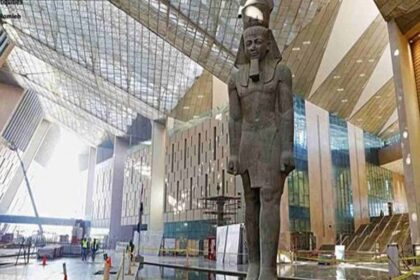Cairo: Jasour – News Desk
In a historic event happening for the first time, the Ministry of Social Solidarity, along with the national councils, namely the National Council for Women, the National Council for Childhood and Motherhood, and the National Council for Persons with Disabilities, gathered for a side event titled “Social and Economic Rights in Egypt.” This took place on the sidelines of the Universal Periodic Review (UPR) of human rights files of member states of the United Nations in Geneva, Switzerland, under the umbrella of the United Nations Human Rights Council.
The session was chaired by Dr. Maya Morsy, Minister of Social Solidarity, and included Counselor Amal Ammar, Chairperson of the National Council for Women, Dr. Sahar El-Sonbaty and Chairperson of the National Council for Childhood and Motherhood, and Dr. Iman Karim, General Supervisor of the National Council for Persons with Disabilities.
In her speech, Dr. Maya Morsy expressed her happiness that this event was organized by the Ministry of Social Solidarity in collaboration with the National Council for Women, the National Council for Childhood and Motherhood, and the National Council for Persons with Disabilities at the United Nations headquarters in Geneva. This indicates the strong partnership between the Egyptian government and the independent national councils.
The Minister of Social Solidarity affirmed that the Egyptian constitution states that “society is based on social solidarity, and the state is committed to achieving social justice and providing means of social solidarity in a manner that ensures a decent life for all citizens, as regulated by law.” The framework of social and economic rights in Egypt guarantees the right to work, social security, education, health, and housing.
Dr. Maya Morsy pointed out that the state has faced complex economic challenges, geopolitical pressures, regional conflicts, and wars. Despite these challenges, Egypt has made significant progress in areas such as infrastructure development, including transportation, energy, urban development, economic and administrative reforms, expanding social safety nets, improving access to healthcare and education, and social inclusion. These efforts address inequalities and ensure the benefits of development are shared among all segments of society.
The Minister of Social Solidarity added that the state has increased public spending allocations for social protection programs to 635.9 billion EGP in the 2024/2025 fiscal year budget. These social protection programs include food support, social and health insurance, social housing, and cash transfer programs. The “Takaful and Karama” program, the largest conditional cash transfer program in the region, aims to improve the conditions of the poorest families. The number of beneficiaries has increased to 4.7 million families, with an additional 500,000 families in collaboration with civil society, reaching 22 million individuals in 2024 at a cost of 41 billion EGP.






